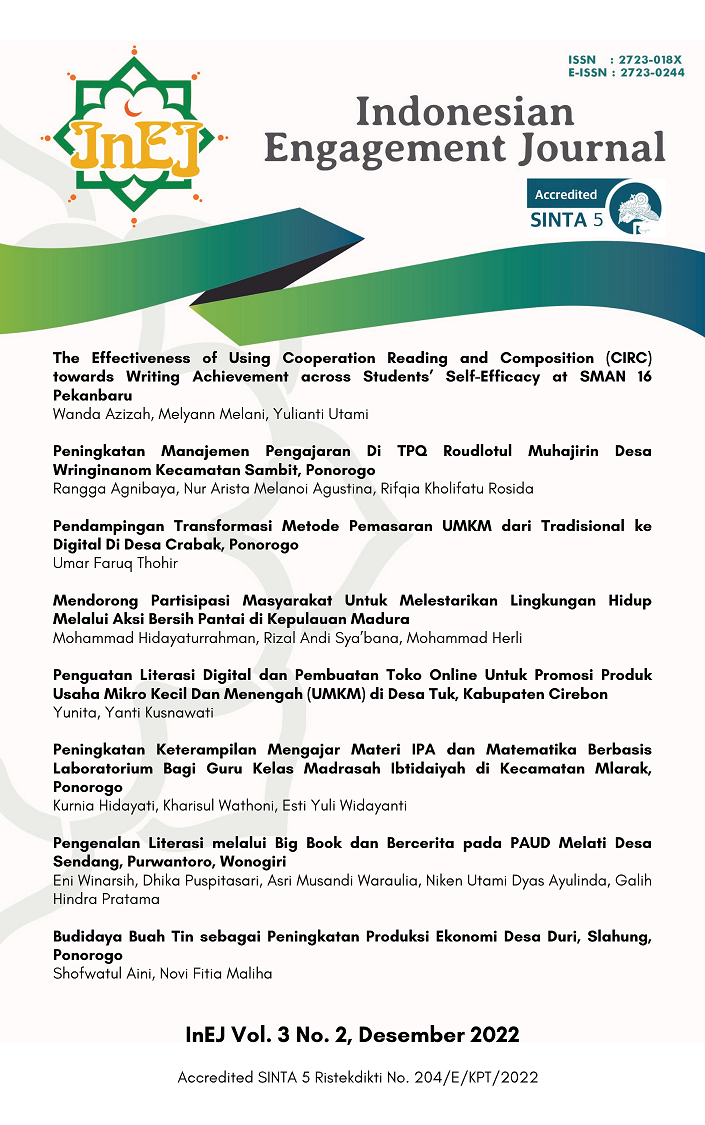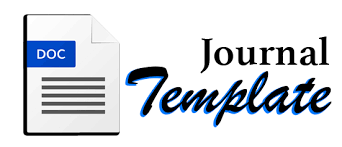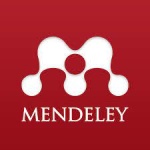PENINGKATAN KETERAMPILAN MENGAJAR MATERI IPA DAN MATEMATIKA BERBASIS LABORATORIUM BAGI GURU KELAS MADRASAH IBTIDAIYAH DI KECAMATAN MLARAK, PONOROGO
DOI:
https://doi.org/10.21154/inej.v3i2.4802Keywords:
Pengabdian kepada masyarakat, Guru Kelas MI, Pembelajaran Materi IPA dan Matematika MI, pembelajaran berbasis laboratoriumAbstract
Kegiatan ini merupakan program Pengabdian kepada Masyarakat dari dosen di lingkup Institut Agama Islam Negeri Ponorogo pada tahun 2021. Dengan mengacu pada kluster pengabdian peningkatan program studi maka pengabdian ini memilih sasaran madrasah ibdidaiyah di lingkup kabupaten Ponorogo. Sasaran dari Pengabdian adalah guru kelas madrasah ibtidaiyah di kecamatan Mlarak sebanyak 25 orang guru. Tujuan dari program pengabdian adalah meningkatkan keterampilan guru kelas dalam pembelajaran berbasis laboratorium untuk pembelajaran materi IPA dan matematika. Metode pengabdian yang digunakan adalah dengan pendekatan edukatif dalam bentuk pelatihan atau workshop. Workshop dilaksanakan dengan strategi pembelajaran langsung menggunakan teknik ceramah, diskusi, demonstrasi, dan praktik. Output atau luaran dari kegiatan pengabdian ini adalah guru kelas yang terampil dalam melaksanakan langkah- langkah pengajaran matematika dan IPA berbasis laboratorium serta guru yang terampil dalam penggunaan alat laboratorium untuk pembelajaran materi IPA dan matematika.
References
Amini, R. Pengembangan Model Pembelajaran Konsep IPA SD Berbasis Kegiatan Laboratorium Menggunakan Pendekatan Savi. repository.unp.ac.id, 2015. http://repository.unp.ac.id/27125/.
Aprilia, T., S. Sunardi, and D. Djono. “Pemanfaatan Media Buku Digital Berbasis Kontekstual Dalam Pembelajaran IPA.” Prosiding Seminar Nasional ”¦, 2017. https://jurnal.fkip.uns.ac.id/index.php/psdtp/article/view/10444.
Ariyati, E. “Pembelajaran Berbasis Praktikum Untuk Meningkatkan Kemampuan Berpikir Kritis Mahasiswa.” Jurnal Matematika Dan IPA. download.garuda.kemdikbud.go.id, 2010. http://download.garuda.kemdikbud.go.id/article.php?article=1564233&val=2343&title=Pembelajaran%20berbasis%20praktikum%20untuk%20meningkatkan%20kemampuan%20berpikir%20kritis%20mahasiswa.
Auliah, L., S. Syaiful, and S. Syamsurizal. “Pengembangan Modul Digital Pembelajaran Matematika Berbasis Pendekatan Open Ended Untuk Meningkatkan Kemampuan Berpikir Kreatif Matematis.” Jurnal Pendidikan Matematika, 2020. https://www.neliti.com/publications/317597/pengembangan-modul-digital-pembelajaran-matematika-berbasis-pendekatan-open-ende.
Data EMIS Kemenag kabupaten Ponorogo
Eko Marpanaji dkk. (2017). Laporan PPM LPPM UNY. Optimalisasi Pengelolaan Laboratorium (Laboratory Management) untuk Meningkatkan Kinerja Pengelola dan Penggunaan Laboratorium Sekolah Menengah Kejuruan.
Eko Setyadi Kurniawam dan Nur Ngazizah. (2017). Surya Abdimas. Peningkatan Keterampilan Guru SD Muhammadiyah Se-Kabupaten Purworjeo Dalam Pengelolaan Laboratorium dan Pengembangan Alat Peraga IPA Terbarukan. Vol 1 No 1 April. 1-5.
https://referensi.data.kemdikbud.go.id/
Haerullah, Ade dan Suparman (2016). Pelatihan dan Pendampingan Praktikum IPA Kontekstual bagi guru setingkat SD di MIN Sasa Kota Ternate. Jurnal Prodi Pendidikan Biologi FKIP Univ. Khairun Ternate Vol 4 no(2) Maret 2016.
Irwanto et al. (2019). Eurasian Journal of Educational Research. Using Inquiry- Based Laboratory Instruction to Improve Critical Thinking and Scientific Process Skills among Preservice Elementary Teachers. Vol. 80 (2019) 151-170.
Peraturan Menteri Agama nomor 55 tahun 2014
Reys, R., & Post, T.R. (1973). The Mathematics Laboratory ”“ Theory to Practice. Prindle, Weber and Schmidt, Inc.
Rofieq, Ainur. 2014. Pembelajaran Berbasis Laboratorium. Badan Kendali Mutu Akademik UMM.
Sudin. (2004). Aplikasia Jurnal Aplikasi Ilmu-ilmu Agama. Pengabdian Kepada Masyarakat bagi Perguruan Tinggi Agama Islam. Vol V No 2, Desember 2004, 161-172.
UU Nomor 12 tahun 2012 tentang Pendidikan Tinggi Pasal 47 Pengabdian kepada Masyarakat.
Van den Berg and Giddings, G. (1992). Laboratory practical work: An alternative view of laboratory teaching, Bentley: University of Technology Western Australia.
Downloads
Published
Issue
Section
License
Please find the rights and licenses in InEJ. By submitting the article/manuscript of the article, the author(s) agree with this policy. No specific document sign-off is required.1. License
The non-commercial use of the article will be governed by the Creative Commons Attribution license as currently displayed on Creative Commons Attribution-NonCommercial-ShareAlike 4.0 International License.
2. Author(s)' Warranties
The author warrants that the article is original, written by stated author(s), has not been published before, contains no unlawful statements, does not infringe the rights of others, is subject to copyright that is vested exclusively in the author and free of any third party rights, and that any necessary written permissions to quote from other sources have been obtained by the author(s).
3. User/Public Rights
The spirit of InEJ is to disseminate articles published are as free as possible. Under the Creative Commons license, InEJ permits users to copy, distribute, display, and perform the work for non-commercial purposes only. Users will also need to attribute authors and InEJ on distributing works in the journal and other media of publications. Unless otherwise stated, the authors are public entities as soon as their articles got published.
4. Rights of Authors
Authors retain all their rights to the published works, such as (but not limited to) the following rights;
Copyright and other proprietary rights relating to the article, such as patent rights,
The right to use the substance of the article in own future works, including lectures and books,
The right to reproduce the article for own purposes,
The right to self-archive the article,
The right to enter into separate, additional contractual arrangements for the non-exclusive distribution of the article's published version (e.g., post it to an institutional repository or publish it in a book), with an acknowledgment of its initial publication in this journal (InEJ: Indonesian Engagement Journal).
5. Co-Authorship
If the article was jointly prepared by more than one author, any authors submitting the manuscript warrants that he/she has been authorized by all co-authors to be agreed on this copyright and license notice (agreement) on their behalf, and agrees to inform his/her co-authors of the terms of this policy. InEJ will not be held liable for anything that may arise due to the author(s) internal dispute. InEJ will only communicate with the corresponding author.
6. Royalties
Being an open accessed journal and disseminating articles for free under the Creative Commons license term mentioned, author(s) aware that InEJ entitles the author(s) to no royalties or other fees.
7. Miscellaneous
InEJ will publish the article (or have it published) in the journal if the article’s editorial process is successfully completed. The editors of Journal may modify the article to a style of punctuation, spelling, capitalization, referencing and usage that deems appropriate. The author acknowledges that the article may be published so that it will be publicly accessible and such access will be free of charge for the readers as mentioned in point 3.




